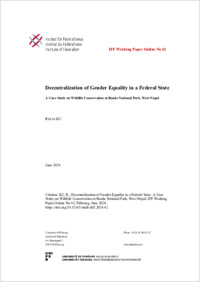Decentralization of Gender Equality in a Federal State : A Case Study on Wildlife Conservation at Banke National Park, West Nepal
- Fribourg : IFF, 2024
decentralization
gender roles
wildlife conservation
Banke National Park
Nepal
women's par-ticipation
gender equality
English
This research paper explores the case study of the decentralization of gender roles and women’s participation in wildlife conservation at Banke National Park in West Nepal. The study examines how decentralization, within the framework of Nepal’s federal state, has brought transformative changes in the roles and engagement of women in conservation. Through qualitative methods such as interviews and observation, the research uncovers the evolving landscape of gender dy-namics, the challenges faced by women in conservation, and the profound influence of decentral-ization on these dynamics. The findings highlight that decentralization has acted as a catalyst for increased female participation in decision-making processes and active involvement in wildlife conservation at Banke National Park. Women have emerged as influential stakeholders in con-servation efforts, as they decentralize power and authority, giving local communities a greater say in their conservation initiatives. However, it is important to acknowledge that despite the positive impact of decentralization, challenges rooted in societal norms and stereotypes persist. The re-search underscores the need for ongoing dedication and policy support to achieve complete gen-der equality in the conservation sector in Nepal.
- Collections
- Faculty
- Faculté de droit
- Department
- Institut du Fédéralisme
- Language
-
- English
- Classification
- Law, jurisprudence
- Series statement
-
- IFF Working Paper Online ; 42
- License
- Open access status
- diamond
- Identifiers
-
- DOI 10.51363/unifr.diff.2024.42
- ISSN 2813-5261
- Persistent URL
- https://folia.unifr.ch/unifr/documents/329126
Statistics
Document views: 292
File downloads:
- 42_Reeta KC: 274
